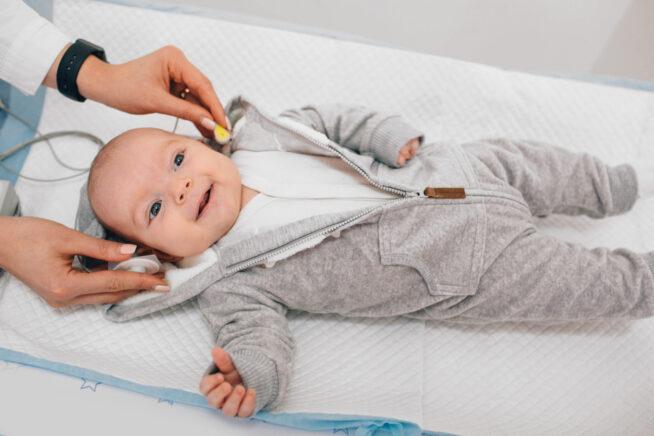What to Expect From Baby’s Hearing Tests
Before baby comes home from the hospital, they will receive a hearing test (also called a hearing screening).
The infant hearing screening helps to see if baby is having any issues with their hearing prior to coming home. If baby is found to have an issue with their hearing, intervening early can help their communication and social-emotional development.

Should baby get a hearing test?
It is recommended by the American Academy of Pediatrics that baby receive an early hearing test. They recommend that baby has a test by the time they are one month old, and ideally before baby comes home from the hospital.
It is also a common practice for baby to get a hearing test: More than 96% of newborns in the United States receive hearing tests within a month of their birth.
Why is it important to get a hearing test for baby?
The hearing (auditory) sense is incredibly important for baby’s communication and social-emotional development. They learn how to talk, respond, and so much more by hearing what’s going on around them. They also form social bonds and understand emotions using their hearing sense.
So, if it is discovered that baby may have a hearing issue, it can help tremendously to address it early. A hearing issue can be identified and baby can receive treatment by as early as 3-6 months, which can have a positive impact on their long-term development.
How is baby’s hearing tested?
There are two different types of infant hearing screening that can be used to test baby’s hearing. Both are used to screen for hearing loss. They are painless and only take a matter of minute to perform. Baby can even be asleep during these screenings.
The two types of hearing tests are:
Automated Auditory Brainstem Response (AABR):
This measures how the hearing nerve and brain stem respond to sound. Baby will wear small headphones, and electrodes will be placed on baby’s head. The electrodes are safe and painless for baby. Clicking noises are played in baby’s ear, and the electrodes measure the hearing nerve and brain stem’s response.
 Image courtesy of HealthyChildren.org
Image courtesy of HealthyChildren.org
Otoacoustic Emissions (OAE):
This test measures if certain parts of the ear respond to sound. A single soft earphone is placed in baby’s ear, and clicks or tones are played. The screening measures the echo responses from certain parts of the ear.
 Image courtesy of HealthyChildren.org
Image courtesy of HealthyChildren.org
What if baby doesn’t pass their hearing test?
Many babies do not pass their first hearing test, but this does not mean they have a hearing issue. In fact, about 1 to 2 in every 100 babies will not pass their first hearing screening, but only about 1 to 3 in every 1,000 babies will be diagnosed with a hearing issue in one or both ears. That means that most babies who don’t pass the first test actually have typical hearing.
There are many reasons why babies with typical hearing don’t pass their first test. They could have fluid in their ear. There could be a distraction in the room, such as loud background noise. Whatever the case may be, the best course of action is scheduling a follow-up hearing test to continue to monitor baby’s hearing.
A follow-up test can be scheduled with a pediatrician. It’s best for the follow-up test to be done before baby is 3 months old. If follow-up tests still indicate a hearing issue, then your pediatrician will recommend a course of treatment, and connect you with healthcare providers that specialize in hearing issues.





